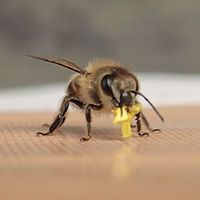Login
SubscribeFeatures

How Manipulating the Plant Microbiome Could Improve Agriculture
Davide Bulgarelli | Feb 1, 2018 | 10+ min read
It has become increasingly evident that, like animals, plants are not autonomous organisms but rather are populated by a cornucopia of diverse microorganisms.

Researchers Learn from Plant Viruses to Protect Crops
Claire Asher | Feb 1, 2018 | 10+ min read
Plants are locked in an ancient arms race with hostile viruses, but genome editing is giving crops the upper hand.

Next-Generation Exoskeletons Help Patients Move
Karen Weintraub | Feb 1, 2018 | 10+ min read
A robot’s gentle nudge could add just the right amount of force to improve walking for patients with mobility-impairing ailments such as Parkinson’s disease, multiple sclerosis, and stroke.
Contributors
Contributors
Contributors
Meet some of the people featured in the February 2018 issue of The Scientist.
Editorial
An Enduring Partnership
An Enduring Partnership
Humanity would be nothing without plants. It’s high time we recognize their crucial role in sustaining life on Earth.
Speaking of Science
Ten-Minute Sabbatical
Ten-Minute Sabbatical
Take a break from the bench to puzzle and peruse.
Freeze Frame
Caught on Camera
Caught on Camera
Selected images of the Day from the-scientist.com
Notebook
Researchers Cryopreserve Coral Sperm
Researchers Cryopreserve Coral Sperm
A project aims to preserve samples of the climate change–vulnerable animals for future restoration.
Researchers Catalog Earth’s Microbiome
Researchers Catalog Earth’s Microbiome
The new database includes data from 27,000 samples collected at sites ranging from Alaskan permafrost to the ocean floor.
Scientists Unite to Save “Monkey Island” After Hurricane Maria
Scientists Unite to Save “Monkey Island” After Hurricane Maria
Puerto Rico’s Cayo Santiago has hosted decades of research in cognition, primatology, immunization, and other areas.
Graduate Student Identifies Dozens of New Fly Species
Graduate Student Identifies Dozens of New Fly Species
Over the past seven years, Xiao-Long Lin has characterized nearly 70 new species of nonbiting midges and developed DNA barcodes to aid in future ecological surveys.
Modus Operandi
Detecting Protein Clumps
Detecting Protein Clumps
A synthetic genetic tool called yTRAP allows high-throughput detection of protein aggregates in cells.
The Literature
Plant Cell Walls Can Control Growth in the Dark
Plant Cell Walls Can Control Growth in the Dark
To maintain an energy-saving growth strategy in the absence of light, seedlings need signals generated by pectin in their cell walls.
War Dance of the Honeybee
War Dance of the Honeybee
One species has developed a novel waggle to warn about invading wasps.
A Newly Identified Photoenzyme Helps Algae Pump Out Fuel
A Newly Identified Photoenzyme Helps Algae Pump Out Fuel
The finding could lead to a new way of producing “green” alternatives to fossil fuels.
Profile
Planting Independence: A Profile of Katayoon Dehesh
Planting Independence: A Profile of Katayoon Dehesh
After a harrowing escape from Iran, Dehesh never shied away from difficult choices to pursue a career in plant biology.
Scientist to Watch
Anjali Iyer-Pascuzzi Investigates How Pathogens Invade Plant Roots
Anjali Iyer-Pascuzzi Investigates How Pathogens Invade Plant Roots
The Purdue University researcher is one of the first to examine the molecular processes that underlie infection by soil microbes.
Lab Tools
Virtual Reality May Revolutionize Brain Science
Virtual Reality May Revolutionize Brain Science
New technology could open doors for researchers studying animals’ most complex organ.
Mapping Brain Proteins
Mapping Brain Proteins
Researchers are using souped-up mass spectrometry to localize proteins within brain cells.
Careers
How to Make Scientists into Better Peer Reviewers
How to Make Scientists into Better Peer Reviewers
From efforts to increase the transparency of the review process to initiatives offering training, there are many attempts underway to make better reviewers out of researchers.
Reading Frames
Agricultural Technology Can Save Humanity from Starvation (Again)
Agricultural Technology Can Save Humanity from Starvation (Again)
We are on the cusp of yet another revolution in how we feed the populace.
Foundations
A Brush with Inheritance, 1878
A Brush with Inheritance, 1878
Lampbrush chromosomes, first observed in the 19th century, still offer an unparalleled glimpse into how genetic information is organized in the cell.



















